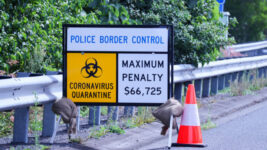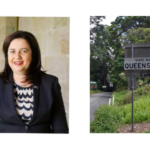Police Officer Charged with Misconduct Over Alleged COVID-19 Breaches

A police officer has been charged with misconduct in public office and suspended from his duties after allegedly helping his daughter cross the Queensland border.
Senior Constable Robert Eickenloff from the Queensland Police Service (QPS) was on duty when he allegedly assisted his 20-year-old daughter unlawfully cross the border at Tweed Heads-Coolangatta last week.
His daughter had been working at the ski fields at Thredbo and wanted to get home to her family in Queensland. It’s alleged she did not have an exemption to cross the border, and that her father, who is reported to have been uniformed and on a motorcycle, escorted her over the border.
Officers report the conduct
Other officer’s became suspicious after allegedly observing their colleague’s conduct at the border, and an internal investigation was immediately launched.
The senior officer’s daughter was subsequently fined $4135 for entering Queensland in breach of health orders and is now in 14-day hotel quarantine.
Senior constable Eickenloff was charged and is due to appear in Brisbane Magistrates Court next month.
Taking risks to get home
The QPS has described the officer’s conduct as ‘disappointing’ while at the same time praising security protocols on the NSW/QLD border.
The incident is also an example of the lengths many in order to get home and be reunited with their families.
Thousands of families remain separated on both sides of the border, and Queensland Premier Annastacia Palaszczuk recently said the border may remain closed over Christmas. And while the ‘border bubble zone’ has been reinstated, the reasons people may cross is extremely limited.
The premier says Queensland’s tight border rules have allowed the sunshine state to remain relatively Covid-free, and thereby enabled residents to enjoy freedoms their southern counterparts have been denied. But the growing uncertainty of not knowing when the border will open is taking its toll.
The offence of misconduct in public office in Queensland
Misconduct in public office is an offence under section 92A of the Queensland Criminal Code 1899 which carries a maximum penalty of 7 years in prison.
A person is guilty of the crime if the prosecution is able to prove beyond a reasonable doubt that he or she:
- Was a public officer, and
- Intended to dishonestly gain a benefit for him or her or to another person, or to dishonestly cause a detriment to another person by:
- dealing with information gained because of his or her office,
- performing or failing to perform a function of the office, or
- doing an act or making an omission in abuse of the authority or office.
The offence of misconduct in public office in NSW
Misconduct in public office is what’s known as a ‘common law offence’ in New South Wales.
Common law is a body of law that has been developed by courts over time, through judges applying the law to the particular facts and circumstances of individual cases.
Essentially, while there is no specific legislation to cover common law offences, they can still be tried in a court of law, and judges use legal principles and legal precedents (judgements made in previous cases) to reach a decision.
Courts have previously found “that it is an offence for a public official, in the course of or connected to his or her public offence, to wilfully misconduct himself or herself by act or omission without reasonable excuse or justification, where such misconduct is serious and meriting criminal punishment.”
No maximum penalty for common law offences
Because it is a common law offence, the penalty for misconduct in a public office is ‘at large’, which means there is no prescribed maximum penalty.
Rather, the punishment is at the discretion of the sentencing judge, who will take into consideration a number of matters including, the seriousness of the offence, its level of sophistication, any breach of trust, any history of offending, any guilty plea, the timing of a guilty plea, as well as the prospects of rehabilitation in determining the appropriate penalty for the offence.
Police misconduct
In New South Wales, charges such as misconduct in a public office are laid after investigations are undertaken by the Independent Commission Against Corruption (ICAC) – the organisation deals with corrupt conduct involving or affecting most of the NSW public sector, including state government agencies, local government authorities, members of Parliament and the judiciary.
ICAC operates under a piece of legislation called the Independent Commission Against Corruption Act 1988 (NSW). It cannot, however, investigate corrupt conduct involving staff of the NSW Police Force and NSW Crime Commission unless the matter involves other NSW public officials.
A separate body, The Law Enforcement Conduct Commission (LECC) is the oversight body for the NSW Police Force and the NSW Crime Commission.
Each of these bodies can investigate allegations, but do not have the power to press charges, rather once an investigation is complete, they can make recommendations to the NSW Director of Public Prosecutions (DPP), which then considers whether to prosecute based on evidence and public interest in the case.
One of the most recent cases of misconduct in a public office involved former NSW MLC Eddie O’Beid who was found guilty of misconduct in a public office in 2016, following an ICAC investigation. He was sentenced to 5 years behind bars.







